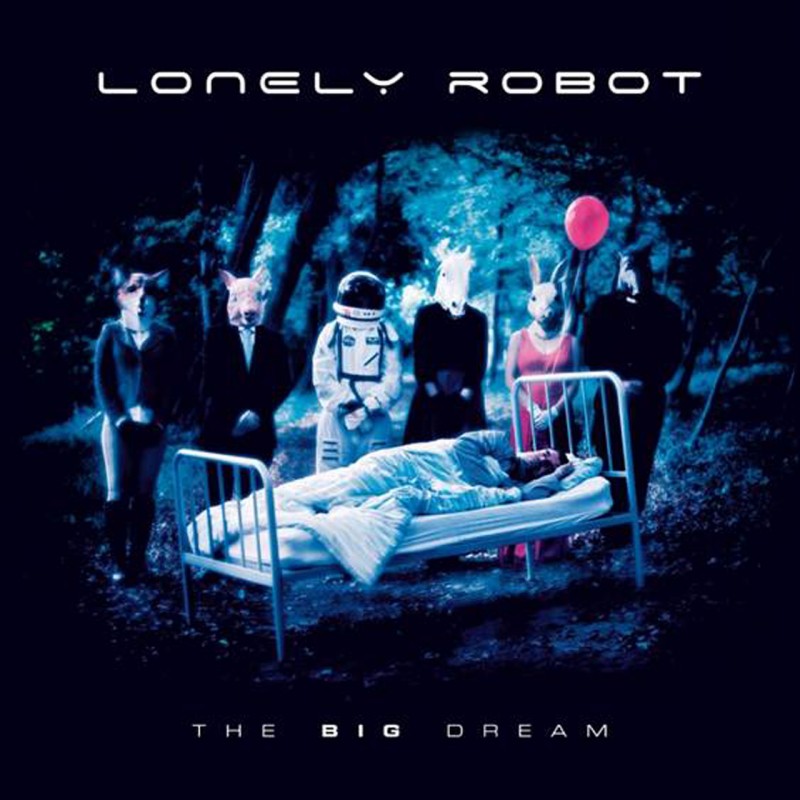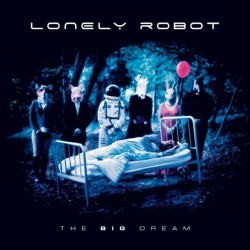With Lonely Robot’s 2015 debut, Please Come Home, singer/songwriter/guitarist John Mitchell provided a solo outing that clearly ranked alongside his work with groups like It Bites and Frost*. In fact, it rightly topped many progressive rock ‘Best of 2015’ lists at the end of that year; since then, fans have been keenly anticipating a worthy musical and narrative follow-up. Fortunately, The Big Dream more than obliges on both accounts, as its heightened emphasis on instrumental elegance and voiceover gravitas, coupled with Mitchell’s characteristically beguiling songwriting and full-bodied singing, make it a more striving, cinematic, and impactful experience.
When we spoke last month, Mitchell described his Lonely Robot venture as “a narrative of humankind, and the idea of being lost in space is a metaphor for humankind being lost within our own surroundings.” Whereas Please Come Home focused on the notion of humans being a “hybrid species” that didn’t originate “100% on this planet,” The Big Dream tackles the more tangible and universal issue of “social disconnect” in relation to hiding behind screens and avoiding face-to-face empathy. It also finds “the Astronaut wak[ing] up from a cryogenic sleep . . . but he's no longer in space. Instead, he finds himself in a woodland area [‘terra firma’], where he comes across people who have animal heads!” In contrast to the handful of guests on its predecessor, The Big Dream features only two other musicians: drummer Craig Blundell (Frost*, Steven Wilson) and vocalist Bonita Mckinney (Creatures of Love), both of whom do a fantastic job making it a more elaborate and poignant affair.
Luscious instrumental opener “Prologue (Deep Sleep)” signifies the enhanced theatricality of the record. Inspired by Clint Mansell (among other composers, such as Jerry Goldsmith, John Williams, Thomas Newman, and Trent Reznor), it’s a successfully magnificent and touching attempt to merge two of Mitchell’s favorite kinds of music, “film soundtracks and heavy rock.” Its initial eerie sparseness—a blend of slow electronic beats, chilling woodwinds, and starry chimes—evokes "The Great Marsh" from Camel’s The Snow Goose in its ominousness, mystery, and isolation. It doesn’t take long, however, for a piano motif to join and fuse with the distorted thematic declarations of a man who’s “often wondered what it would be like to go to sleep and never wake up.” Afterward, cautionary strings guide the arrangement as it explodes into a triumphant outburst that adds marching percussion to the established elements. It’s really a breathtaking composition and a fine way to start the journey.
“Awakenings” comes next and packs the kind of dense and catchy punch that Mitchell is known for. Specifically, it conjures the immediately engrossing chorus of It Bites’ “Wallflower,” and its backing harmonies, soulful guitar solo, and perpetual dynamic shifts are obvious standouts, too. “Sigma” is equally powerful but also a bit more fun and lively, with McKinney’s subtle accompaniments assisting the wonderful airiness that permeates between the celestial chords and synths. She has a slightly stronger presence on “In Floral Green,” a heartfelt and gripping piano ballad (with delicate textural flourishes) that stands as one of Mitchell’s most heartfelt and treasured compositions ever. As for “Everglow,” it houses both some of the most intricate guitar riffs/syncopation and some of the most dreamily tranquil deviations on The Big Dream, making it a fine representation of everything Lonely Robot does.
Centerpiece “False Lights” is a serene gem that highlights the duality of Mitchell and McKinney’s voices over a collage of shimmering instrumentation. It’ll definitely get stuck in your head, as will the quick pace and welcoming edge of “Symbolic,” which also features a brief return from the aforementioned philosopher. There’s a true emotional weight to the scarcity of “The Divine Art of Being,” as Mitchell conveys endearing hopefulness and urgency on top of alluring drumming and other beautiful yet distressing tones. Unsurprisingly, the title track is the most “prog” of the bunch; a lengthy instrumental, it recalls some of the atmospheric of “Prologue (Deep Sleep)” while adding a lot of vibrant frenzy as it moves from section to section. In a clever bit of continuity, it also offers more narration, plus the “Please come home, lonely robot” line from Please Come Home near the end (albeit in a more robotic and unsettling fashion). It’s a brilliant touch.
The final song on the album, “Hello World Goodbye,” is actually Mitchell’s favorite because it was inspired by a friend who passed away and it reminds him “of how transient things are. How little time you have.” Essentially, it’s a piano ballad with dominant electronic beats and spacey tones, and it features the best performances so far from him and McKinney as a vocal duo. There’s also a particularly impassioned and resonate guitar solo near the end, and it’s quite moving lyrically as well. The Big Dream closes with another instrumental, “Epilogue (Sea Beams),” a fanciful ode that’s fuller and more colorful than its introductory counterpart. Not only is a masterful work on its own, but it adds a sense of closure and completeness to the sequence (especially since it ends with the computerized spurt that began “Prologue”).
The Big Dream is another astounding work from one of the leading singer/songwriters in his field. Mitchell maintains everything that made Please Come Home artistically successful while also challenging himself (and listeners) with a wider scope and palette. Sure, there’s a bit of familiarity to it, but it’s never overbearing, and the likeness it shares with its prequel make it feel crucially connected. As impressive as its songs are, though, what truly shines here are the bookended instrumental masterpieces, both of which demonstrate how great Mitchell would be as an actual film composer. Beyond being more diverse and ambitious than its predecessor, The Big Dream is one of Mitchell’s greatest accomplishments to date. As such, it leaves little doubt to how great the third (and final?) chapter in the saga will be.


